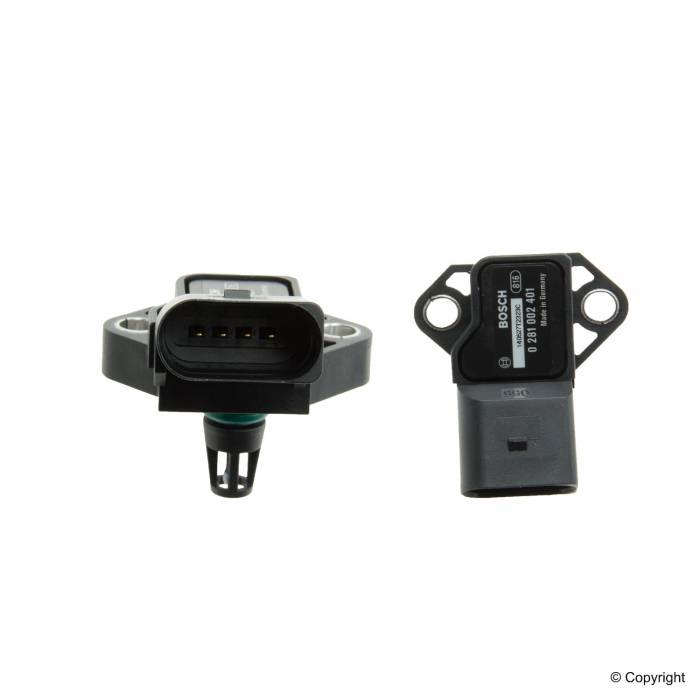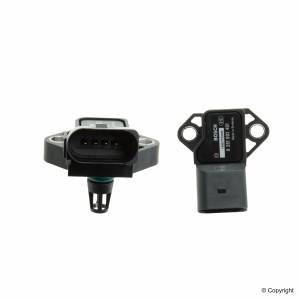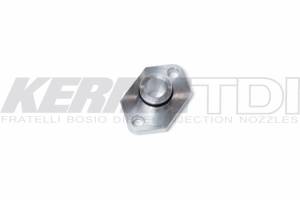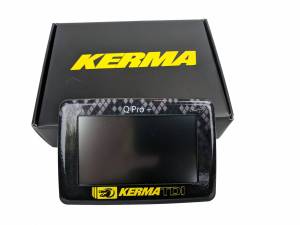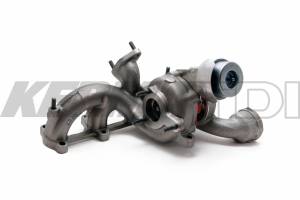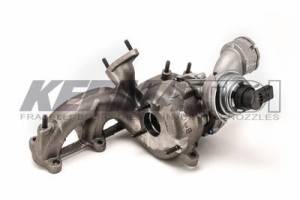Three Bar Map Sensor '3 BAR'
Description
Bosch Part #- 0281002976, 0281002401, 038906051C, Superseded by 03G906051M
We very strongly recommend this sensor when upgrading the turbo in your ALH, BEW, or BRM.
Touaregs and Passats come with this 3-bar sensor as original equipment. However, it offers an expanded operating range compared to the original (2.5 bar) sensor that is on many of our TDI's from the factory. The 3-bar range supports the higher turbo pressures we like to use with our upgrade turbos. If you have an upgrade turbo, and don't have this sensor, you are effectively limited to the performance of your stock turbo. This sensor is not compatible with A3/B4 cars, which use a MAP sensor integral to the ECU.
Please note that you must notify your tuner that you are using a 3-Bar sensor. Installing a 3-Bar sensor without a tuning adjustment can raise your boost pressures to turbo damaging levels!!!
Installing this sensor on an ALH-engined car will require the fabrication of an adapter grommet or gasket. The ideal material for this is a piece of 4mm thick rubber; easily found a the local hardware store. We also offer a sweet little adapter, machined from billet aluminum, that works great for this purpose.
For those of you who want more details, a Technical discussion follows. First some definitions !
"MAP" sensor is an acronym for "manifold absolute pressure"
"bar" is a measure of pressure. 1 bar is roughly equal to atmospheric pressure (or barometric pressure) at sea level. This is roughly 14.7 psi or so.
"Absolute pressure" is the total pressure in the manifold, including atmospheric pressure. When you look at a boost gage, you are seeing what is known as "gage pressure", or the pressure above atmospheric that is in the intake manifold. Absolute pressure adds atmospheric pressure to gage pressure, so when deciding how much "boost" your sensor needs to support, add 1 bar (14.7 psi)to what you see on your boost gage.
Technical Discussion:
The original equipment on 90 and 100 HP TDI models (ALH 90 hp, BEW 100 hp, BEW 100 hp) sensor is 2.5 bar, or about 22-23 psi as seen on a boost gage at sea level. This means the original Equipment sensors are able to go as high as 23 Psi on your boost gage (which is 2.5 bar, or 2.5 atmospheres, absolute pressure.) So, theoretically, you should be able to support up to 23 psi with a factory map sensor, right?
Well, not really. Here's why.
First, there's a margin of control, or "window" of control, in the turbo feedback loop. This window is as much as 200-300 mbar (or about 3-5 psi) in size, depending on the particular ECU version. So, ideally, you would have AT LEAST that much of a gap between the boost setpoint and the max the sensor can read. After we subtract our control margin, we have roughly 18.5 psi to work with, using the factory 2.5 bar sensor.
Another thing to consider: The "overboost" protection limit (to trigger "limp mode") is about 400 mbar (6 psi) from the boost setpoint. This is your turbo's ultimate overspeed protection! So you need to add about 6 psi to your boost setpoint to find the range of sensor needed, IF you want to keep the factory overboost protection fully functional. In other words, if we don't want to override the overboost protection, then under the best circumstances we are stuck with 16-17 psi! Allowing an overboost protection limit that is higher than the sensor can read, effectively disables your overboost protection. Some tuners may think it's great not to trigger limp mode anymore, but at Kerma that's not how we roll. We want our customers to drive their cars, not work on them, and they should remain reliable and safe, even after you add the fun! In other words, we prefer the ECU to keep full control over the turbo. That includes keeping all safety provisions intact and fully functional. This way, you get a warning when something is "not right" and requires attention.
Of course, the overboost limiter and control window can be reconfigured by tuning the ecu, but most tuners dont bother to do this. (Or don't know about it, until they read this). But there is also a good reason the protection margins are configured this way at the factory.
In our experience, most of these "limp modes" happen under part throttle conditions. Keep in mind, transient operating conditions are highly variable, and we don't want to trigger too many spurious limp modes at part throttle. At the same time we want to provide adequate overspeed protection for the turbo under full load conditions. Making the overboost protection margin smaller, to allow for higher boost with the factory sensor, is bound to trigger many unnecessary, spurious, "limp modes", under part throttle conditions (when we are not as concerned about over-speeding the turbo!)
The bottom line is when you upgrade your turbo...
Upgrade your existing 2.5 BAR MAP to this 3 BAR MAP for better boost control and safety when upgrading your turbo to run higher boost pressure!
Please note that you must notify your tuner that you are using a 3-Bar sensor. Installing a 3-Bar sensor without a tuning adjustment can raise your boost pressures to turbo damaging levels!!!
Installing this sensor on an ALH-engined car will require the fabrication of an adapter grommet or gasket. The ideal material for this is a piece of 4mm thick rubber; easily found a the local hardware store. We also offer a sweet little adapter, machined from billet aluminum, that works great for this purpose.
This sensor is not compatible with A3/B4 cars, which use a MAP sensor integral to the ECU.
Reviews / Q&A
Details
- 3BARMAP
- 3BARMAP
- Bosch
- New
Categories
Shipping Information
- Item Requires Shipping
- 0.8 lbs.
- W3.0000” x H3.0000” x L3.0000”


